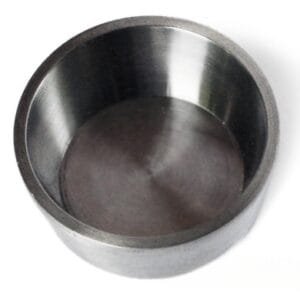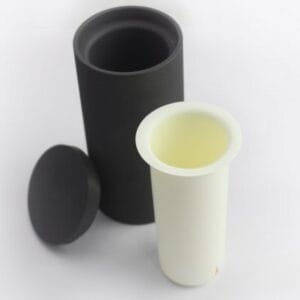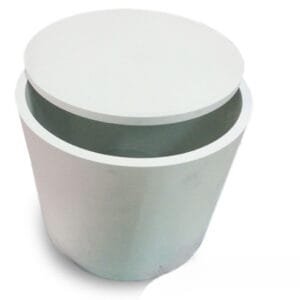Ni Crucible Specifications
Below is our regular product list. We can also customize various shapes according to your requirements or drawings. Contact our experts for further information.
| Product Code | Capacity | Top Dia. | Bottom Dia. | Height | Thickness |
| (mL) | (mm) | (mm) | (mm) | (mm) | |
| NiC101 | 5 | 21 | 21 | 19 | 0.94 |
| NiC102 | 15 | 36 | 32 | 23 | 0.94 |
| NiC103 | 25 | 40 | 47 | 23 | 0.94 |
| NiC103A | 30 | 41 | 21 | 35 | 0.85 |
| NiC104 | 35 | 40 | 47 | 30 | 0.94 |
| NiC104A | 50 | 47 | 25 | 40 | 0.85 |
| NiC105 | 55 | 40 | 47 | 42 | 0.94 |
| NiC106 | 75 | 51 | 44 | 42 | 0.94 |
| NiC107 | 100 | 59 | 53 | 46 | 0.94 |
| NiC108 | 250 | 83 | 72 | 60 | 0.94 |
Nickel Crucible Price Referrence
- Nickel Crucible Ni 99.6% 30mLUS$4.50
In Stock #NiC103A With or Without Lid
- Nickel Crucible Ni 99.6% 50mLUS$6.99
In Stock #NiC104A With or Without Lid
Description
Nickel crucibles stand as essential tools in high-temperature applications, renowned for their durability, thermal stability, and resistance to corrosion. Our Nickel Crucibles are made from 99.5% pure nickel, making them highly resistant to strong alkalis and phosphoric acid. They are designed to withstand harsh use with their thicker bases and lighter walls. However, it’s worth noting that Nickel Crucibles are not the best choice for acid and sulfur compound solvents.
Nickel Crucibles find applications in diverse fields, including metallurgy, chemical processing, materials research, and laboratory settings. Their ability to withstand harsh conditions while maintaining dimensional stability and purity makes them indispensable for tasks such as melting and casting metals, performing high-temperature reactions, and conducting experiments in controlled environments.
Nickel Crucible Applications
Nickel Crucibles find applications across a range of industries and scientific fields due to their unique properties and ability to withstand high temperatures and corrosive environments. Here are some common applications:
- Metallurgy:Nickel crucibles are widely used in metallurgical processes for melting, casting, and refining metals and alloys. They can withstand the high temperatures required for metal melting without reacting with the molten metal, ensuring purity and integrity of the final product.
- Chemical Processing:In chemical laboratories and industrial settings, nickel crucibles are utilized for carrying out high-temperature chemical reactions, including synthesis, decomposition, and purification processes. Their resistance to corrosion from acids and other reactive chemicals makes them suitable for handling a wide range of substances.
- Materials Research:Nickel crucibles are indispensable tools in materials research and development laboratories for studying the properties of materials at high temperatures. They are used for growing single crystals, conducting phase transformations, and analyzing material behavior under extreme conditions.
- Ceramics and Glass Production:Nickel crucibles are employed in the production of ceramics and glassware, where they serve as containers for melting and shaping raw materials into finished products. Their thermal stability and inertness make them ideal for maintaining precise temperature control during the manufacturing process.
- Semiconductor Manufacturing:In the semiconductor industry, nickel crucibles are used for melting and refining semiconductor materials such as silicon, gallium arsenide, and indium phosphide. They provide a controlled environment for crystal growth and doping processes critical for semiconductor device fabrication.
- High-temperature Furnaces:Nickel crucibles serve as containment vessels in high-temperature furnaces used for heat treatment, sintering, and annealing of materials. They withstand prolonged exposure to elevated temperatures without deforming or reacting with the furnace atmosphere.
- Powder Metallurgy:In powder metallurgy processes, nickel crucibles are utilized for compacting and sintering metal powders into solid components. They facilitate the consolidation of metal particles into dense, fully bonded structures with minimal porosity.
- Analytical Chemistry:Nickel crucibles are employed in analytical chemistry techniques such as gravimetric analysis and sample preparation for atomic absorption spectroscopy. Their high purity and chemical inertness ensure accurate and reproducible results in quantitative analysis.
These diverse applications highlight the versatility and importance of Nickel Crucibles in various industrial, scientific, and research endeavors.
Packaging
Our Nickel Crucibles are clearly labeled externally to ensure efficient identification and quality control. We take great care to prevent any damage during storage or transportation.








Reviews
There are no reviews yet.